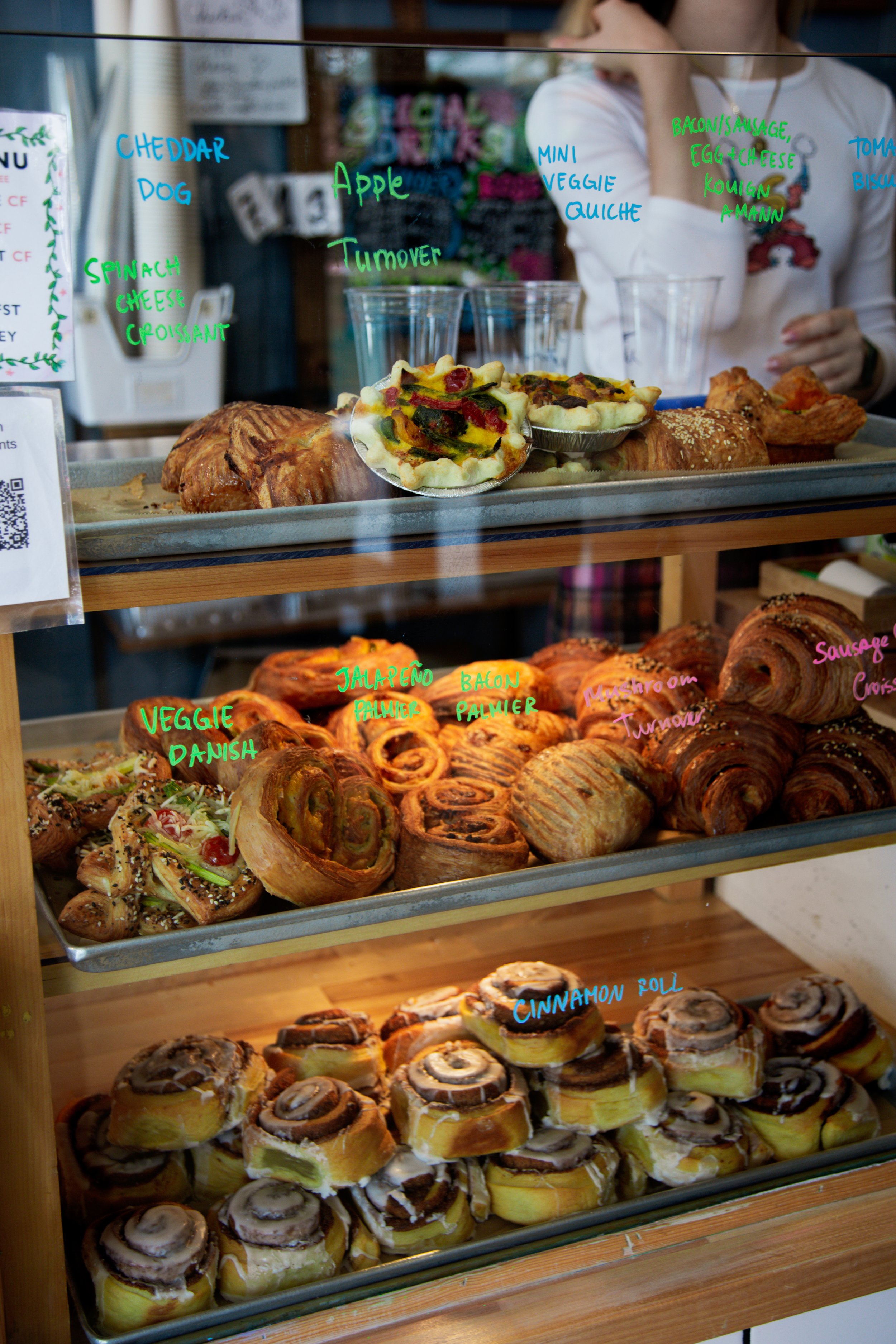CLEMENTINE: FLOUR, SUGAR, AND A SPRINKLE OF PLANT BASED MAGIC
Written by Dalia Ramirez
Photography by Ashvini Navaratnam, Assistance by Kerishma Narayansamy
Read more about Clementine: The plant-based bakery woven into Brooklyn's community fabric, where founder Elle Barton's passion for baking and sustainability has created a beloved local gem.
There are thousands of bakeries in New York City. You likely don’t have to go more than a few blocks from your apartment to find a blueberry muffin or a chocolate croissant. But some shops are sweeter than most, like Clementine, a self-described “plant-based and community-rooted” bakery in the heart of Clinton Hill, Brooklyn.
With seasonal ingredients and handmade small-batch baked goods “made with love,” Clementine is a neighborhood gem that stands out for its family feel.
Founder Elle Barton worked in New York kitchens before rediscovering her childhood passion for baking. She noted how the bakeries she had worked in ran their businesses, getting all her ducks (vendors) in a row before officially opening Clementine Bakery in 2012.
“I grew up in a house where my grandmother was baking a lot — baguettes, savory things, sweet things….” Barton says. “I liked the comfort of that environment, so I was trying to find something close to that feeling.”
Clementine has stood out from other local bakeries — especially during its early years — for offering entirely plant-based goods, some gluten-free. Barton explained that the cultural perspective on veganism, especially in Clinton Hill, has changed a lot in the past ten years.
“I’ve been vegan for a long time,” Barton says, “but there didn’t used to be a lot of options. Early on, people felt excluded from the whole ‘veganism thing’ and had their own ideas of what that meant — assuming it wouldn’t be good because it was vegan or ‘too healthy.’”
Because of this stigma, she made an effort to brand Clementine more subtly: “You wouldn’t know [it was vegan] unless you walked in and spoke to someone.” Now, plant-based restaurants and bakeries have become much more popular, dispelling earlier misconceptions about the lifestyle.
With that popularity has come a boom in plant-based ingredients, which Barton says has elevated the quality of the baked goods Clementine can offer.
“Now, we can make things where you would have no idea it was dairy-free; you couldn’t do that 20 years ago.”
For Barton, plant-based goes hand-in-hand with climate consciousness, which she keeps in mind by sourcing ingredients locally. “We’re trying to really pay attention to our carbon footprint and do whatever we can,” she says. “I try to find different manufacturers that have local ties to flour, herbs — anything that’s not shipped in.”
Clementine also keeps the eco-friendly approach on the back end in what Barton calls a “full-spectrum process.” They try to redirect the bakery’s waste sustainably through several methods: composting, passing unpurchased baked goods to their sister ice cream shop next door to incorporate into ice cream, and selling their end-of-day leftovers through Too Good to Go, an app that facilitates purchases of imperfect or unsold food at popular restaurants.
Clementine’s sustainable process and growing popularity have allowed it to expand past its original doors, with its founder opening Dreamery, the ice cream parlor next door, a plant-based cocktail bar called Izzy Rose, and a vegan French patisserie called Le Petit Monstre.
“It was so small in the beginning,” Barton says. “It went from a very small operation to a big part of the community. I’ve seen people move in and out of the neighborhood, form relationships, get married… I’ve seen staff open their own places… It’s been a really beautiful experience.”
Barton attributes some of Clementine’s growth to her personal growth, from learning to better support staff to juggling running the bakery with motherhood. “My kids have grown up in this environment,” she says. “I think it’s really nice for her to see women working together and being a part of that — seeing how a job can be anything you want it to be.”
It’s not a bad place for a kid to grow up; bakeries have a reputation for being a warm, communal environment. They have a certain magic about them: watching bread rise, pulling apart layers of flakey croissants, arranging the cases in the early morning.
Some of that magic even inspired the bakery’s name. “Clementine was my cat,” Barton says.” Clementine frequented the bakery but was soon joined by a doppelganger, another orange cat that monitored the front door for the bakery’s first year. One cat tends to be a good sign; two is a great one.
Clementine seems to be the kind of place where employees stick around. Still, Barton doesn’t expect them to. “I want people to have their things — and I’m actually happy when people move on to the next thing. This can be a small step on the way to whatever they want to do.” At Clementine, the sky’s the limit.








